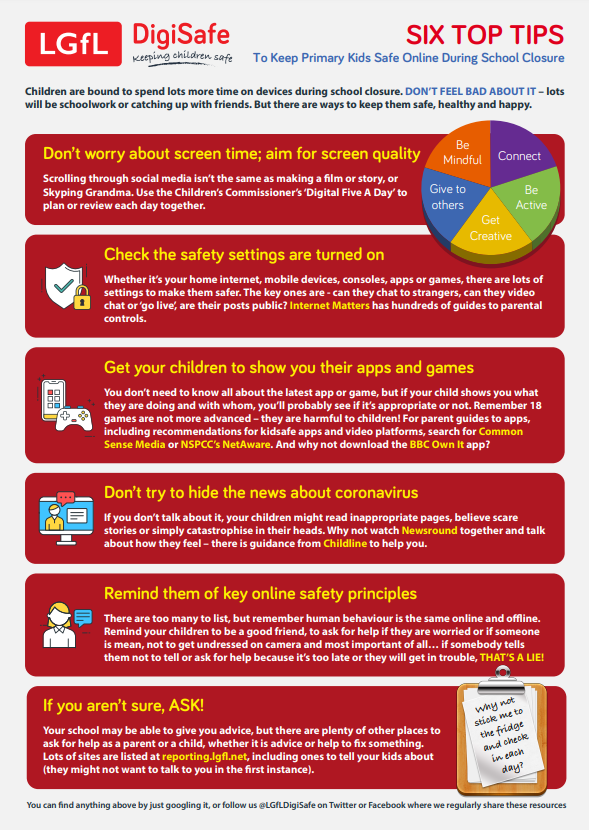Safeguarding
If you have concerns about a child's welfare or a child discloses information that causes you concern, please notify the Designated Safeguarding Lead or Deputy Safeguarding Lead.
(You can use these same contacts whether Home Learning or if your children are in school)
Designated
Safeguarding Lead:
Miss K Moneypenny
Headteacher
Deputy Designated
Safeguarding Leads:
Mr D Mattingly
Deputy Headteacher
Mrs S Treveil
Learning Mentor
Mrs V Forde
Learning Mentor
Nominated Governor for Child Protection:
Mrs V Baker / Mr M Dyer
Governor
For further details on Safeguarding at Richmond, please read our school Safeguarding Policy
National Contacts if you are concerned about a child outside of school:
| NSPCC | 0808 800 5000 |
|---|---|
| ChildLine | 0800 1111 (Free phone) |
| Police | 999 / 101 |
Online Safeguarding Information:
Keeping Children Safe online during Remote Learning
Remote Learning is a new way to help support your child and their education whilst they can not physically attend school.
Whilst it is an exciting and useful tool to be able to learn online, we would like to take the opportunity to remind you of the importance of online safety when remote learning and different online platforms are being used by your children.
Today’s pupils are growing up in an increasingly complex world, living their lives seamlessly on and offline. This presents many positive and exciting opportunities, but also challenges and risks. In school, we teach the children about these risks and how to stay safe when online.
To help support parents/carers with this when pupils are working from home, we would like to offer the following support / advice:
When watching online lessons – things to consider:
- Ensure your child has a clear, quiet workspace
- Make sure they have a comfortable seat and that the screen is at an appropriate height for them to look at for an extended period
- Ensure your child has the required resources at the start of the lesson
- Monitor your child to ensure they understand what is being asked of them
- Remember you can email the school with work questions / queries via: homelearning@richmond-pri.southend.sch.uk
We can help protect our children by teaching them ‘critical thinking skills’ - a way of thinking that helps them spot potential harm and work out what to do.
Critical thinking empowers children because they can take what they know and adapt it to new situations or to solve problems that may emerge.
Thinking about what we see online – questions to consider:
- is this website/URL/email fake? How can I tell?
- what does this cookie do and what information am I sharing?
- is this person who they say they are?
- why does someone want me to see this?
- why does someone want me to send this?
- why would someone want me to believe this?
- why does this person want my personal information?
- what’s behind this post?
- is this too good to be true?
- is this fact or opinion?
Useful weblinks for parents / carers:
Helping parents keep their children safe online: https://www.internetmatters.org/?gclid=EAIaIQobChMIktuA5LWK2wIVRYXVCh2afg2aEAAYASAAEgIJ5vD_BwE
NSPCC: https://www.nspcc.org.uk/keeping-children-safe/online-safety/
ThinkuKnow – An education program to support online safety for children: https://www.thinkuknow.co.uk/
Family friendly filters: https://www.internetmatters.org/parental-controls/
Staying safe at home online: https://www.internetmatters.org/resources/staysafestayhome-tech-advice-for-families/
Top Tips for Digital Safety:

